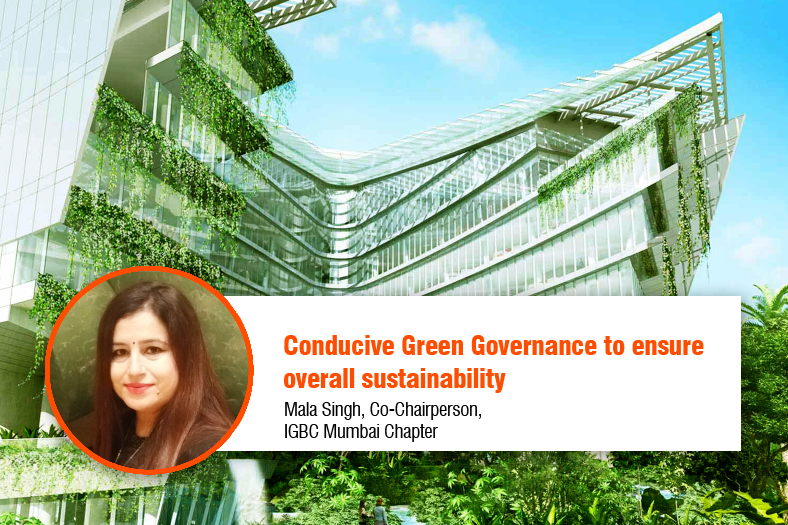Conducive Green Governance to ensure overall sustainability

Earlier, there was no specific Green Building code mandatory in India and the country was driven more by the aspirations of private companies than legislation set by government. There was just an EIA clearance process by Ministry of Environment, Forest and Climate Change (MoEF) for which there were various stipulated conditions mentioned in the environment clearance. Now, however, the scenario has changed drastically.
According to Mala Singh, Co-Chairperson, IGBC Mumbai Chapter, the environmental norms have been made more stringent, also most of the green building norms are an integral part of the clearance. All construction projects with more than construction area of 20,000 sq.mt. India hopes to be a global leader by 2025, on-ground implementation of these policies is a vital aspect for making environmental sustainability a ground reality. The clearance mandates norms for waste management, sewage treatment, rainwater harvesting and generation of solar power and climate-compliant thermal envelope of all built structures. Certified green buildings are now incentivised based on the achieved benchmark levels. Several states in India including Maharashtra, have now FSI benefits to the developers as per new development control rules and reduction in development charges along with rebate in property tax to the tenements. Environment clearance conditions and green building norms have lot of synergy altogether to ensure overall sustainability in any project including implementation of ECBC and NBC Codes from the design planning level. If India hopes to be a global leader by 2025, on-ground implementation of these policies is a vital aspect for making environmental sustainability a ground reality. Green governance is the most neglected aspect of policy implementation. Due to the various government campaigns like Swacch Bharat Abhiyan, Make in India, Clean and Green India, etc. every person is becoming gradually aware of environmental degradation and subsequent need for conservation. Hence, demands green homes.
Current status of green ratings
Indian Green Building Council (IGBC) has more than 25 rating systems in India to promote green building movement. “Site sustainability, water efficiency, enhanced energy performance, sustainable building materials and indoor environmental quality are the sustainability parameters that must account for- in the planning, design and construction of IGBC Certified green buildings. Considering the warm and humid climate of Mumbai, natural and enhanced ventilation with dehumidification is the best method to achieve occupant comfort,” said Singh. The lack of land and water resources in the city’s snug urban fabric, highlight the ardent need for conservation of these resources. Integration of sustainable vegetative pockets in the city is another urgent need to improve the air quality and avoid a Delhi-like consequence.
Availability of green products and materials
In India, so far, the focus has been on environmental protection as a priority; as well as on carbon emissions and waste management. Very little importance was given to product oriented standards till recent time. The development and implementation of standards for green products (such as GreenPro – an IGBC Initiative) is bringing about a change in the market availability of green products and boosting their demand in Indian markets.
Effective communication of green products to consumers in India is also one of the major challenges taking into consideration, the limited knowledge on green products and minimal information disclosure of the same. “The lack of understanding of eco-label usage for products makes it difficult for the consumers to differentiate between the nationally or internationally accepted eco-labels and the spurious self-declared claims made by the manufacturers. IGBC Certified Green buildings result in major resource conservation,” says Singh.
Environment clearance conditions and green building norms have lot of synergy altogether to ensure overall sustainability in any project including implementation of ECBC and NBC Codes from the design planning level.
Mala Singh, Co-Chairperson, IGBC Mumbai Chapter
10
Cookie Consent
We use cookies to personalize your experience. By continuing to visit this website you agree to our Terms & Conditions, Privacy Policy and Cookie Policy.









